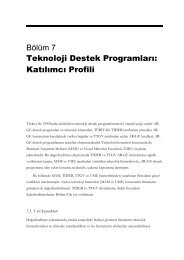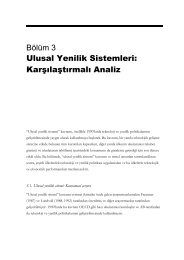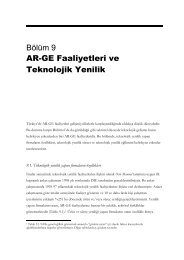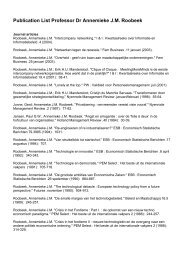Biotechnology Research Roadmap - Science and Innovation
Biotechnology Research Roadmap - Science and Innovation
Biotechnology Research Roadmap - Science and Innovation
Create successful ePaper yourself
Turn your PDF publications into a flip-book with our unique Google optimized e-Paper software.
5.5.7 <strong>Research</strong> to support the effective development <strong>and</strong><br />
management of biotechnology<br />
Following on from the recommendations of the Royal<br />
Commission on Genetic Modification the government<br />
has directed research investments towards the societal<br />
implications <strong>and</strong> environmental impacts of emerging<br />
biotechnologies.<br />
This research mostly aims at contributing knowledge<br />
to support:<br />
• the ethical <strong>and</strong> safe regulation of New Zeal<strong>and</strong><br />
developed <strong>and</strong> imported biotechnologies;<br />
• the prevention <strong>and</strong> management of adverse<br />
impacts; <strong>and</strong><br />
• the socially <strong>and</strong> environmentally responsible<br />
development of biotechnologies.<br />
<strong>Research</strong> strengths<br />
New Zeal<strong>and</strong> researchers are currently building<br />
research strengths in developing models to underst<strong>and</strong><br />
the impacts of genetically modified crops on<br />
agricultural eco-systems <strong>and</strong> the social context shaping<br />
attitudes <strong>and</strong> values towards emerging biotechnologies<br />
within New Zeal<strong>and</strong>.<br />
Current investment levels <strong>and</strong> trends<br />
Investments in this area currently make up 2% of<br />
the total investment in biotechnology research.<br />
Proportionally, current investments are weighted<br />
towards environmental impacts research (87%) <strong>and</strong><br />
investments are distributed across a range of research<br />
providers.<br />
Issues or gaps<br />
End-user feedback suggests that the current<br />
configuration of environmental <strong>and</strong> social impacts<br />
research has resulted in some fragmentation between<br />
research providers <strong>and</strong> the need for better connectivity<br />
with the largely government sector users of this<br />
research. This in turn suggests that there is a need for<br />
greater strategic oversight to shape the future direction<br />
of this research investment area.<br />
5.5.8 <strong>Research</strong> commercialisation – streamlining processes<br />
The long lead time to market with biotechnology<br />
products requires long-term research investments.<br />
An issue which has been identified is the need for<br />
more streamlined research funding processes at both<br />
an intra <strong>and</strong> inter-research funding <strong>and</strong> investment<br />
agency level.<br />
The government’s research funding output classes <strong>and</strong><br />
schemes span the research spectrum <strong>and</strong> are managed<br />
by multiple funding <strong>and</strong> investment agencies. The<br />
vertical nature of these funding pots can inhibit the<br />
progression of the best ideas along the pathway towards<br />
commercialisation.<br />
The recently completed New Economy <strong>Research</strong><br />
Fund (NERF) evaluation also pointed out a perceived<br />
gap between the basic-targeted research funded by<br />
NERF <strong>and</strong> access to follow-on research funding that<br />
bridges the gap to commercialisation.<br />
Furthermore, there is a degree of confusion about<br />
the degree of overlap between NERF <strong>and</strong> the more<br />
applied <strong>Research</strong> for Industry (RFI) fund. 78 To add<br />
weight to this observation, as of 2005-06, 40% of NERF<br />
funding is directed towards applied or experimental<br />
research <strong>and</strong> 32% of RFI is directed towards basic<br />
research.<br />
There is scope here for further RS&T system policy<br />
work to investigate options for tackling these issues.<br />
There is also scope for future improvements both<br />
between, <strong>and</strong> within, research funding agencies to<br />
streamline the progression of the best research towards<br />
commercial application coupled with the appropriate<br />
review mechanisms to filter quality. One particular<br />
area identified is the need to investigate whether<br />
health biotechnology research funding processes are<br />
appropriately aligned between the HRC <strong>and</strong> FRST.<br />
78<br />
ABT Associates (September 2005), op-cit, p.67-68<br />
48 <strong>Roadmap</strong>s for <strong>Science</strong> : biotechnology research





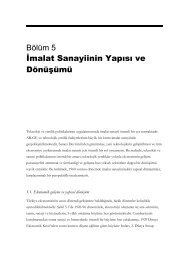
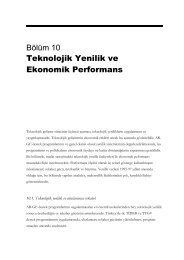

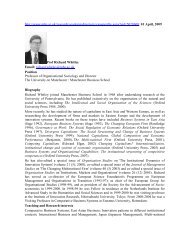

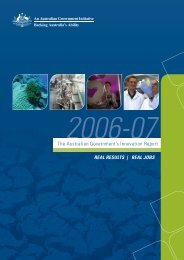
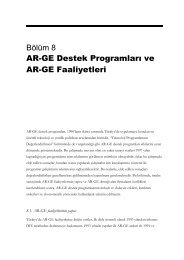
![[Tam] Uygula[ya] - Bilim, Teknoloji ve Ä°novasyon Politikaları TartıÅma ...](https://img.yumpu.com/36820041/1/184x260/tam-uygulaya-bilim-teknoloji-ve-anovasyon-politikalara-tartaama-.jpg?quality=85)
